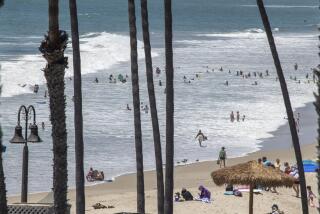Differ on Minimum Age, ‘Happy Hours’ : Army, Navy in Dispute Over Drinking
- Share via
WASHINGTON — Navy Secretary John F. Lehman Jr., a flamboyant man who likes to pilot naval helicopters to his out-of-town speaking engagements, is said to agree with Gen. George Patton that “if you don’t drink well, you don’t fight well.”
Gen. John A. Wickham Jr., Army chief of staff, is known as a strait-laced soldier who believes that alcohol erodes the fighting spirit.
Their contrasting beliefs have erupted into a high-level version of an Army-Navy barroom brawl.
Surfaced in Memos
At issue are the proper drinking age for servicemen at military clubs and the propriety of cut-rate drinks at “happy hours.” The dispute has surfaced in memos to Defense Secretary Caspar W. Weinberger and spilled into at least one top Pentagon policy-making session.
Wickham in April banned discount drinks at Army clubs and events, saying that such price cuts “are not consistent with Army policies and programs to eliminate alcohol-related problems.”
“We have a responsibility to bring up people in uniform in a healthier environment,” an Army spokesman said.
The drinking issue first sputtered to life last fall at a meeting of the Armed Forces Policy Council, a group of top officials headed by Weinberger. Air Force Secretary Verne Orr, whose service clubs also offer cut-rate drinks at “happy hours,” commended Wickham for his directive, said a senior defense official who attended the meeting.
Aided ‘Esprit de Corps’
“Lehman jumped in and said it wasn’t the way to go, that ‘happy hour’ contributed to esprit de corps and shouldn’t be compromised,” the official said. “Wickham then gave his speech about drunk driving and alcoholism and how it doesn’t make sense for the military to subsidize it.”
A Navy spokesman said that happy hours subsidize morale, not drunkenness. “Happy hours provide a place for the guys to get together as a group and holler,” he said. “It’s very good for morale. If you want to keep them off the road, you have to give them some inducement to drink at the base.”
A spokesman said that Wickham acknowledged that such get-togethers boost morale, but “the chief thinks there are ways for soldiers to have that comradeship without alcohol as a focal point.”
Army clubs will continue to have happy hours, the spokesman said, although the “primary emphasis” will be on food and family-style entertainment, such as magic shows and sports. Alcoholic beverages will continue to be sold--at full price.
Edict Required
A Pentagon personnel specialist said that there would be no move to standardize happy hours for all services unless problems develop, such as a mass off-hours exodus to Navy clubs.
But a Defense Department edict was required to resolve Army-Navy differences over drinking-age limits at military installations.
The issue surfaced last year after Congress, in an effort to cut drunken-driving deaths among teen-agers, passed legislation requiring states to increase their minimum drinking age to 21 by 1987 or lose part of their federal highway funds.
Deputy Defense Secretary William Howard Taft IV, applying the new law to domestic military bases, issued a memorandum Aug. 24 to armed-services secretaries directing them to set minimum drinking ages in line with local laws. He left implementation, however, to the secretary of each military department and offered “reasonable latitude” to base commanders “to make exceptions to the policies where the circumstances would foster morale, esprit and unit cohesion.”
Navy Continued Policy
Given this latitude, the Navy continued its 12-year policy of permitting clubs to sell 3.2% beer to sailors regardless of age while requiring them to comply with state drinking age laws for hard liquor.
But the Army issued regulations last May mandating strict conformity with state laws. As an exception, local commanders could authorize the sale of beer and wine to soldiers regardless of minimum-age laws.
Faced with discrepancies among the services and within the Army itself, Taft decided to draft a standard policy. He finally sided with the Army, issuing guidelines last month requiring military clubs in the Navy, Army and Air Force to adhere to state laws on all alcoholic beverages. The one exception is when the facility is located near the border of a state with more lenient drinking-age laws.
More to Read
Get the L.A. Times Politics newsletter
Deeply reported insights into legislation, politics and policy from Sacramento, Washington and beyond. In your inbox twice per week.
You may occasionally receive promotional content from the Los Angeles Times.










